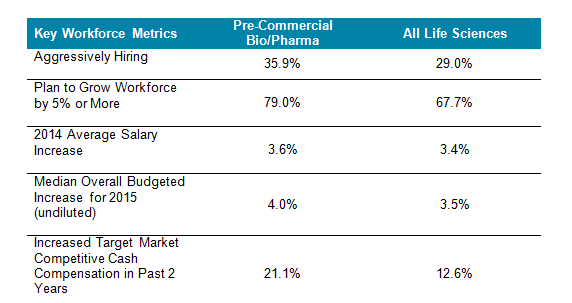Biotechnology companies are leading the life sciences sector in competitive pay positioning amid robust growth opportunities.
For those working in the life sciences sector, it is commonly known that the biotechnology industry remains a highly competitive field. NASDAQ's Biotechnology Index outperformed the general market by 60% in 2014 and has risen 227% in the past four years. Although the stock index had a slight correction in late March, many analysts are urging investors to buy back what they consider to be shares discounted to their true value.
The rising stock valuations for biotech companies in recent years impact the job of human resources professionals in several ways. Rising stock prices drive the value of employees' equity, sometimes requiring companies to adjust future awards and new-hire grants. (Our recent paper describes how these market forces are impacting new-hire equity awards in the technology sector.)
The current environment is also making recruitment more challenging. Biotech companies are growing rapidly as they test new drugs and form partnerships with outside sectors, including technology companies, and increasing their workforce to meet growth demands. At the same time, these companies are facing competition for talent from companies in the overall healthcare sector. In a competitive hiring environment, we're seeing related industries poach talent from one another. A recent survey by the recruiting firm Real Staffing Group found 20.9% of pharmaceutical and biotech companies are beginning to recruit from outside their industries and 17.9% are recruiting internationally.
The field is becoming even more competitive with the growing number of biotech companies going public. In 2014, there were 102 healthcare IPOs in the US in 2014 — 71 of which were biotech companies, according to PwC. That surpasses the 47 biotech IPOs in 2013. While IPO activity has slowed during the first quarter of 2015, biotech and healthcare continue to lead activity.
To find out how rising stock prices and a competitive labor market are impacting compensation decisions and employee turnover, we analyzed a variety of key workforce metrics using the Radford Global Life Sciences Survey.
Effective Employee Retention
To stay ahead of the competition, biotech companies are aggressively hiring and increasing cash positions and salary budgets at a higher rate compared to all life sciences companies. Consider the following data from Radford's Q1 2015 Workforce Trends Report:

The data represents more than 150 US pre-commercial bio/pharma companies vs. the wider universe of US-based life sciences companies in our survey database. Biotech companies reported higher rates of salary increases in 2014, in addition to a higher overall budgeted increase for 2015 at 4.0% compared to 3.5% for all life sciences. Furthermore, a greater percentage of biotech companies have increased their target market competitive cash compensation in the past two years compared to all life sciences companies. Biotech firms are also more aggressively hiring with nearly eight out of 10 companies saying they plan to grow their workforce by 5% or more.
The industry's rising stock price and healthy salary increases are translating to fewer employees leaving biotech companies. Median voluntary turnover for US pre-commercial bio/pharma companies is 8.1% for the first quarter of 2015 (on a 12-month trailing basis) compared to 9.4% for all US life sciences companies and 10.4% in the technology sector.
Many biotech employees are likely also staying put because it's an exciting time to be working in the industry. There is a certain buzz around the groundbreaking work biotech companies are developing, including cancer-fighting drugs.
Next Steps
Biotechnology companies are on a hiring spree, budgeting for higher salary increases, and enabling greater values of employee equity through rising stock prices. These practices are having a positive impact on employee retention.
Some stock analysts caution that the industry could be in a bubble. While our workforce data show these firms are aggressively hiring and using salary increases to effectively retain employees, the figures we collected above, at least, don't suggest the irrational exuberance that can accompany market bubbles.
Turnover in biotech is lower than the three-year life sciences average of 8.5%. Three years ago is when the labor market began showing real signs of recovery from the Great Recession of 2008-09 and more employees switched jobs as opportunities became available. Yet, turnover in biotech has remained low in the face of this improved job market — telling us that these companies are doing an effective job of retaining employees and keeping them motivated, at least for the time being.
To learn more about participating in a Radford survey, please contact our team. To speak with a member of our compensation consulting group, please write to consulting@radford.com.
Related Articles